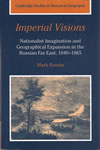Introducing
 Mark Bassin (Chicago, 1953) obtained his PhD at the University of California-Berkeley. He is currently Professor of Human Geography at the University of Birmingham. Professor Bassin’s research interests are related to political, cultural and historical geography. Geographies of nationhood and national identity are among his key interests.
Mark Bassin (Chicago, 1953) obtained his PhD at the University of California-Berkeley. He is currently Professor of Human Geography at the University of Birmingham. Professor Bassin’s research interests are related to political, cultural and historical geography. Geographies of nationhood and national identity are among his key interests.
Another example is geopolitics and the role of space and territory in contemporary political ideologies. He has further developed a considerable expertise in Russia, Poland and Germany.
Geopolitical Passport
Your relationship with geopolitics
At what age did you discover geopolitics and what attracted you to it?
I became interested as a student, primarily in terms of its historical associations with German Fascism.
Which geopolitical topics have your focus and why did you choose especially these?
I am interested in the history of geopolitical theory, and more generally in theories about space, place and politics. Related to this is my interest in geographical or environmental theories about ethnicity and nationhood.
What do you consider your most important contribution to geopolitics?
My work has been in two areas:
- The political and intellectual history of geopolitics from the late 19th century to 1945, especially in Germany.
- The renaissance of geopolitics as part of the development of neo-conservatism since the end of the Cold War, in Russia, Germany and the United States.
My geopolitical preferences
What is your favourite definition of geopolitics?
For the most part, my research focuses on the traditional sense of geopolitics, which assumes that factors of geography, environment and space all have a significant influence on, or “determine” political processes.
The interesting question for me is not the normative veracity of this assumption—clearly politics is not determined by geography—but rather how the argument is articulated and what sort of role it plays in shaping broader political and ideological discourses. In this way, we can see that geopolitical thinking has been extraordinarily important in shaping the political life of the last century, both political discourse but also political practice.
Which geopolitical scientist do you admire the most?
I am very fascinated by the work of Friedrich Ratzel. “Admire” is not the right word: Ratzel was after all an active member of German national-conservative movements and a highly influential supporter of German colonialism. But he was a very remarkable scholar, who established the field of political geography logically on the naturalistic principles of his Anthropogeographie and by so doing became a sort of grandfather of geopolitics.
In his work, moverover, one can see the ways in which a geo-determinist bias actually worked against the assumptions of “racial science” that was popular in his day and which became the basis of Nazi ideology. Ratzel was one of those deeply contradictory thinkers whose contradictions provide much insight into basic issues and ideas of their day.
What is your favourite geopolitical book?
Not an easy question. In all honesty I would have to point to the work of the Russian Eurasianist Petr Nikolaevich Savitskii, “Россия: Особый географический мир” (“Russia: A Special Geographical World”).
Savitskii makes a brilliant case for the physical geography and ecology of the Russian landmass as the basis for the development of a particular form of Eurasian civilization, which determines Russia’s geopolitical identity and what he refers to as its geopolitical destiny. Eurasianism has experienced a remarkable renaissance in post-Soviet Russia, and so Savitskii’s Eurasian geopolitics has resurfaced in national discourses.
I regard Savitskii’s work rather like that of Sigmund Freud: although the theories are ultimately not entirely convincing, the boldness of the vision and the brilliance and originality of the arguments are exhilarating, and compel us to see the issues in a genuinely new way.
What is your favourite geopolitical website?
Again, “favourite” is a bit misleading as it might imply sympathy and support on my part, but I would nominate the website of the Henry Jackson Society: Project for Democratic Geopolitics, maintained out of Cambridge University. I find it fascinating because it is the clearest and most explicit example of how neo-conservative politics (in its peculiar British expression) engages with and adopts the postulates and conceptual legacy of 20th century geopolitics. There is a substantial amount of original thinking here, albeit deployed to support political policies which many academic political geographers (myself very much included) will not find particularly appealing.
The geopolitical future
In what direction(s) will geopolitical science be heading the coming decades?
The end of the Cold War saw a great efflorescence of interest in geopolitics, and I believe this will grow greater in coming decades. This interest is directly linked to the break-up of the static bi-polar arrangement of global politics and the re-emergence of Great Powers and the multi-lateral disputes between them. This new global scene will insure the relevance of a geopolitical perspective well into the future.
Which geopolitical subject has been too little in the spotlight and needs further research?
The prophets of globalization grew hoarse repeating their mantras about the dissolution of political boundaries and the demise of the nation-state. The collapse of this particular vision raises new questions about the persistence of the nation as the primary unit of social identification and coalescence, and about the imperative of territorializing the nation through the institution of political sovereignty. This is an important subject for geopolitical research.
What will be the largest geopolitical challenge for the world in the 21st century?
There are many contenders for this distinction, but I would point to the problem of energy security. It is remarkable that, despite all of the attention it attracts, the European Union has failed to take up this challenge and attempted to formulate a coherent and balanced strategy.

